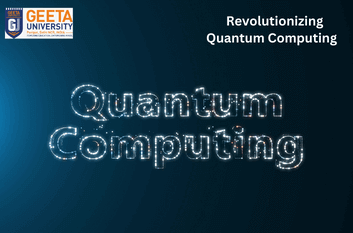Revolutionizing Quantum Computing – Geeta University
Uncategorized Best Career Options in geeta university, best college, best diploma university in haryana, Best engineering College in Haryana, best Law college in Haryana, best mba college in haryana, best MCA college in haryana, Best University in Haryana, Geeta University, Uncategorized
Revolutionizing Quantum Computing – Geeta University
Quantum computing is a rapidly developing field that has the potential to revolutionize computing as we know it. Traditional computers operate on bits, which can only be in one of two states: 0 or 1. However, quantum computers operate on qubits, which can exist in a superposition of states. This allows for quantum computers to perform certain tasks exponentially faster than classical computers.
One of the most interesting applications of quantum computing is in the field of cryptography. Quantum computers have the potential to break many of the encryption methods that are currently used to secure sensitive data. This has resulted in a race to develop new encryption methods that are resistant to quantum attacks.
Another area where quantum computing is expected to have a significant impact is in the field of optimization. Many problems that are currently intractable for classical computers, such as finding the optimal route for a traveling salesman, can be solved much faster using quantum computers.
Despite its promise, quantum computing is still in its early stages of development. There are many technical challenges that must be overcome before practical quantum computers can be built. One of the biggest challenges is achieving and maintaining the delicate quantum states required for qubits to function properly.
To better understand the potential of quantum computing, let’s consider a simple example. Suppose you have a combination lock with 10 digits. If you were to try every possible combination using a classical computer, it would take 10^10 attempts to find the correct combination. However, a quantum computer could solve this problem using Grover’s algorithm, which can find the correct combination in just √10^10 attempts. This may not seem like a huge improvement for such a small problem, but for larger problems, the difference becomes much more significant.
One of the most well-known quantum computing companies is IBM, which offers a cloud-based quantum computing platform called IBM Quantum Experience. This platform allows anyone to run quantum algorithms on actual quantum hardware or simulators.
There are also several programming languages and libraries that have been developed for quantum computing. One such language is Qiskit, which is an open-source Python library for quantum computing. It allows developers to build and run quantum circuits, as well as perform simulations of quantum algorithms.
Conclusion:
Quantum computing has the potential to revolutionize computing as we know it. While there are still many technical challenges that must be overcome before practical quantum computers can be built, the possibilities for quantum computing are endless. As more progress is made in this field, we can expect to see more exciting applications and advancements in quantum computing.
And if you want to keep pace with the digital era, then enroll yourself at the top university in Delhi,NCR i.e. Geeta University.
Related Posts
BUILDING THE FUTURE: A DETAILED LOOK INTO RESILIENT INFRASTRUCTURE DESIGN
BUILDING THE FUTURE: A DETAILED LOOK INTO RESILIENT INFRASTRUCTURE DESIGN Introduction Resilient infrastructure design has emerged as a critical concept in the realm of urban planning and civil engineering. With the increasing frequency and intensity of natural disasters, coupled with

The Role of Technology in Modern Business: Trends and Insights – Geeta University
The Role of Technology in Modern Business: Trends and Insights – Geeta University Technology has become an indispensable part of modern business. From small startups to large multinational corporations, businesses of all sizes are relying on technology to stay
The Importance of Soft Skills in Today’s Job Market
The Importance of Soft Skills in Today’s Job Market In today’s fast-paced and ever-evolving job market, technical skills alone are no longer enough to guarantee career success. Employers are increasingly seeking individuals who can adapt to changing environments, work well



